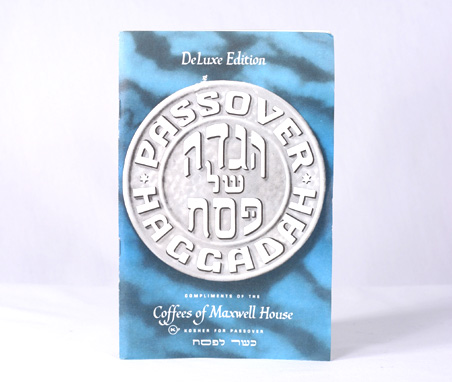Almost every year, we buy at least one new Hagadah. This year we bought the Encylopedia Talmudit Hagadah. It was pretty good for background, but had very little commentary on the meaning of the text itself. Other hagadot that I enjoy are the Safrai's Hagadat Chazal, and Rav Kasher's Hagadah Shleima. A number of years ago I found in a used book store in Detroit another one of Rav Kasher's hagadot - the Israel Hagadah. It has been out of print for years, and is a beautiful book - I felt like I was stealing it by only paying six dollars.)
In any case, this year we had the seder by my brother-in-law and we needed to bring over some English hagadot. We brought some Artscroll ones for the kids, and two others by Elie Wiesel and Rav Riskin. But since we needed more, I also brought an old Maxwell House hagadah. These are very popular - everyone has probably seen one. It was a marketing tactic by Maxwell house going back to the 1930s. (Read about it here.)
Here's one of the earlier ones:
And here's a more recent one:
I always wondered why Maxwell House was sponsoring Hagadot. But then I got to thinking: coffee is made from beans. And beans are usually considered kitniyot, which we wouldn't be able to eat on Pesach. So maybe Maxwell House was able to get on the good side of the kitniyot prohibition by distributing thousands of free hadadot?
Something to think about...
Monday, April 25, 2005
a Maxwell House conspiracy?
Subscribe to:
Comment Feed (RSS)
|